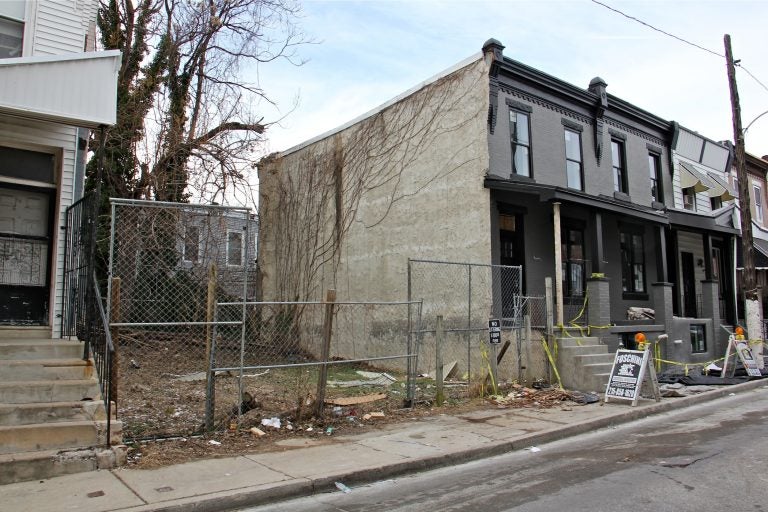Council passes overhaul for Philly’s troubled public land sale process
New City Council legislation will change the way Philadelphia sells off thousands of publicly owned properties, crack down on land-flipping and cronyism.

A Philadelphia judge purchased this row home at 1514 N. Hollywood Street and the two adjacent vacant lots from the city. (Emma Lee/WHYY)
A package of changes to Philly’s troubled public land sale process was approved unanimously in City Council.
The legislation that passed Thursday, introduced by Councilmember María Quiñones-Sánchez on behalf of Council President Darrell Clarke in June, aims to streamline the overall land sale process, increase the number of properties sold to minority- or woman-owned companies, and crack down on land-flipping.
“We put together a disposition policy that is uniform, that is clearly equitable,” Clarke said Thursday. “It puts in position certain parameters around the actual process, not leaving it to the whims of any individual in government or out of government.”
The legislative package came in the wake of reports detailing issues with the sale process’s efficiency and, in some instances, linking Clarke and other council offices to requests for proposals or sales that appeared to favor politically connected individuals.
Ebony Griffin, a lawyer with the Public Interest Law Center who works with community groups seeking to acquire public land, said Clarke’s new legislation was a step in the right direction.
“Overall, I think the purpose behind this bill was good,” she said. “It makes sense to consolidate and streamline this process, even if it could have gone a few steps further.”
The biggest changes in the new bill are the creation of a uniform sale system and scoring mechanism that will guide all property dispensation. In a notable change from the current system, the bill creates a defined 30-day timeline for the city to respond to so-called “expressions of interest” submitted by people seeking to buy public land. That 30-day window brings transparency and increased efficiency, Griffin said.
“We’ve heard about so many situations where people put in an application and never hear back. For years in some cases,” she said.
Certain applicants, like those seeking to acquire a side yard adjacent to a primary residence or a community garden group seeking land, would proceed through a simplified, non-competitive sale process.
But developers would engage in a competitive bidding process, submitting proposals that are graded using the new scoring rubric to determine a winner.
The rubric sets weighted scores for different aspects of a development proposal: 20% for “development experience and capacity;” 20% for “financial feasibility;” 15% for “public purpose or social impact;” 10% for project design; and 5% for the prospective buyer’s offer price.
The most influential factor, at 30%, is based on “economic opportunity and inclusion.”
That notion of opportunity and inclusion is a priority for Clarke, who talks about helping black developers in a city where most developers are white men.
In February, his office argued that the sale of city land to a black developer may have advanced without a proper competitive bidding process because “if everything went to the highest bid, then lower-income, black developers, minority developers, people who don’t have a lot of capital to work with, they would never ever be able to complete a sale.”
On Thursday, the council president framed the new rubric as a corrective for a system “weighted towards individuals that had the most money.”
“This notion of the highest bidder created an environment where individuals who had all the money and all the resources got all the properties,” Clarke said. “We don’t think that’s fair.”
Griffin praised the nod to diversity and the attempt to create an objective scoring standard, but she said many of these categories seemed ambiguous. She pointed to the potential for situations in which a minority contractor seeking to build luxury housing could beat out an affordable-housing developer.
“My first reaction was, ‘What does “economic opportunity” mean?’ It could mean opportunities for affordable housing, but without more context, I’m just not sure,” Griffin said. “I like the fact that diversity and inclusion gets such a high rating, but my next reaction is that things like ‘public purpose’ get a really low score.”
In all instances, the new legislation requires this process to complete within 120 days. Final sales would require a vote by City Council, mandated through a clause in state law.
Clarke also said the bill would end situations in which buyers sought to game city land sales for profit. In December, PlanPhilly reported that Common Pleas Court Judge Rayford Means had purchased city land nominally as a side yard for a secondary property he owned. Instead, he flipped the land to a private developer for a handsome profit.
“Individuals would have to establish owner-occupancy,” Clarke said. “You must live in that property for a period of time before you’re able to dispose of that property.”
The legislation enshrines in law aspects of an earlier land reform memo issued by Mayor Jim Kenney, such as removing the “redundant” Vacant Property Review Committee — a Council-created board at the center of some land sale controversies — from the sale process.
“We are supportive of the intent of the legislation and appreciate the council president’s willingness to work with us on amendments,” said Kenney spokesman Mike Dunn. “We will now review the measure as approved with today’s final passage.”
However, the final bill was amended numerous times in recent weeks as the council president and the Kenney administration negotiated aspects of the legislation — although sources said Kenney’s staff ultimately sought more changes.
Griffin also said the bill failed to address the fundamental issue that many land sales would still rely on the tacit or explicit approval of district Council members to move forward.
“It’s a good start,” Griffin said. “The elephant in the room in this is that it’s all dependent on the councilperson’s prerogative.”
PlanPhilly’s Jake Blumgart contributed reporting.
This story has been updated to correct an error in a quote from Council President Clarke.
WHYY is your source for fact-based, in-depth journalism and information. As a nonprofit organization, we rely on financial support from readers like you. Please give today.







